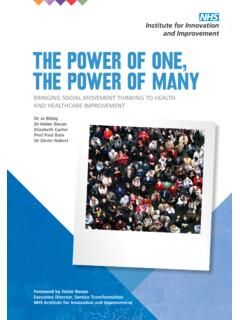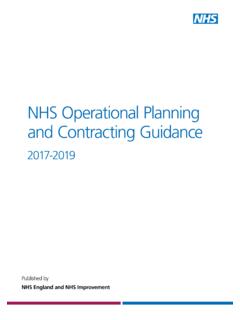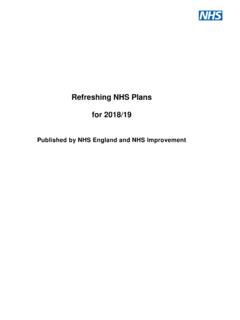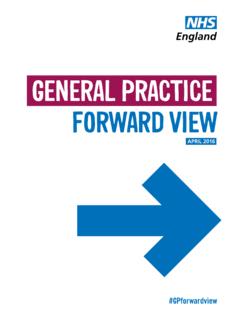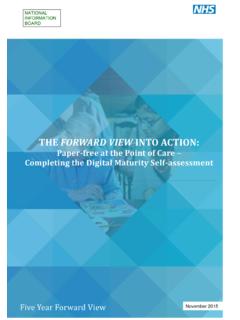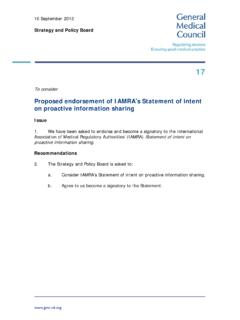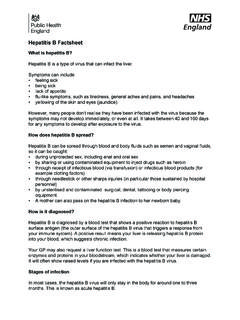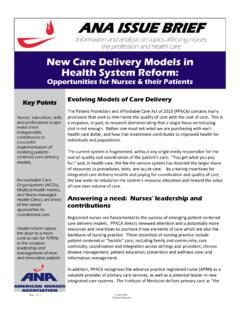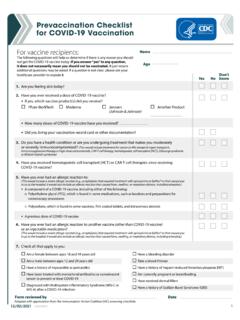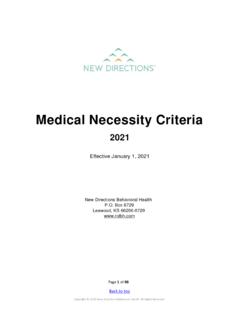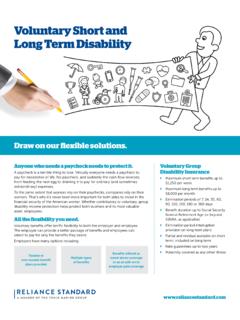Transcription of NHS England Dementia: Good Personalised Care and Support ...
1 NHS England Dementia: Good Personalised care and Support Planning Information for primary care providers and commissioners OFFICIAL 2 NHS England INFORMATION READER BOXD irectorateMedicalOperations and InformationSpecialised CommissioningNursingTrans. & Corp. StrategyFinancePublications Gateway Reference:06447 Document PurposeDocument NameAuthorPublication DateTarget AudienceAdditional Circulation ListDescriptionCross ReferenceAction RequiredTiming / Deadlines(if applicable)Dementia: Good care PlanningSuperseded Docs(if applicable)Contact Details for further informationDocument Status0 This is a controlled document.
2 Whilst this document may be printed, the electronic version posted on the intranet is the controlled copy. Any printed copies of this document are not controlled. As a controlled document, this document should not be saved onto local or network drives but should always be accessed from the intranet. GuidanceLS2 7UE0113 824 9478 Claire FryNHS England - Medical Directorate: Dementia5W25, Quarry House, Quarry HillLeedsThis guide is aimed at primary care and commissioners, particularly GPs, who provide care plan reviews. It is designed to help improve care planning in dementia by supporting a standardised approach, highlighting good practice, ensuring alignment with relevant cross-condition care plans and help to reduce local variation in the EnglandFebruary 2017 CCG Clinical Leaders, CCG Accountable Officers, Allied health Professionals, GPs, Primary care staff and commissionersCCG Clinical Leaders, CCG Accountable Officers, Primary care staff and commissioners, Allied health Professionals, GPsN/AN/AN/A OFFICIAL 3 Dementia.
3 Good Personalised care and Support Planning Subtitle: Information for primary care and commissioners Version number: 2 Updated: February 2020 First published: February 2017 Prepared by: NHS England , Mental health and Dementia: Older People and Dementia Classification: OFFICIAL Promoting equality and addressing health inequalities are at the heart of NHS England s values. Throughout the development of the policies and processes cited in this document, we have: Given due regard to the need to eliminate discrimination, harassment and victimisation, to advance equality of opportunity, and to foster good relations between people who share a relevant protected characteristic (as cited under the Equality Act 2010) and those who do not share it.
4 And Given regard to the need to reduce inequalities between patients in access to, and outcomes from healthcare services and to ensure services are provided in an integrated way where this might reduce health inequalities. OFFICIAL 4 This is a controlled document. Whilst this document may be printed, the electronic version posted on the intranet is the controlled copy. Any printed copies of this document are not controlled. As a controlled document, this document should not be saved onto local or network drives but should always be accessed from the intranet.
5 OFFICIAL 5 Contents 1 Introduction .. 6 2 Components of Dementia Personalised care and Support Planning: the fundamentals .. 7 7 When should Personalised care and Support planning take place?.. 8 What Support is needed to ensure Personalised care and Support planning is undertaken consistently, reliably and continues to happen? .. 9 What should be the process for Personalised care and Support planning for dementia? .. 10 3 Core elements of a Personalised care and Support 10 4 Exemplar Personalised care and Support 14 Table 1: Examples of good practice.
6 14 5 Implementation: 16 Electronic Personalised Careand Support Plans .. 16 Table 2: Examples of correlated condition care plans and resources to inspire primary care thinking for dementia .. 17 Table 3: Advice for Commissioners .. 18 Table 4: Post Diagnostic Provision .. 18 OFFICIAL 6 Dementia Good Personalised care and Support Planning 1 Introduction Personalised care and Support planning (PCSP) planning is a priority for NHS England and plays a vital role in improving the quality of mental health and dementia services. NHS England is committed to: supporting the delivery of the recommendations in the Prime Minister s challenge on dementia 2020 including improving the quality of post-diagnosis treatment and Support for people with dementia and their carers ; and leading a step change in the NHS in preventing ill health and supporting people to live healthier lives , a key priority in the NHS England Mandate.
7 PCSP is a crucial element in delivering improved care for all people living with dementia, and supporting their families and carers. This has been brought into sharp focus through the CCG Improvement and Assessment Framework which includes indicators for dementia diagnosis and post diagnostic Support . This document has been developed with input from a diverse range of people living with dementia, their carers and health and social care professionals, to offer a quality assurance framework to enable more effective care planning, Personalised and responsive to needs and preferences.
8 There is an urgent need to ensure every person who has dementia has an individual PCSP and to aim for, wherever possible, greater integration with Support plans in other areas such as social services. The information provided in this resource document highlights the key characteristics of a PCSP for dementia and is aimed at primary care and commissioners who provide PCSP reviews as part of the Quality Outcomes Framework (QOF) incentive scheme in primary care . Improved Personalised care and Support planning in dementia services will be achieved by: supporting a standardised approach reducing unwarranted local variation in process or outcomes; promoting equality and tackling health inequalities; ensuring alignment with relevant cross condition care plans such as diabetes; and drawing on examples of good practice around the country.
9 This resource document covers: The components which constitute the minimum information to be included in a good care plan. Examples of dementia PCSPs that are already being used at a local level. OFFICIAL 7 Considerations for computer systems available in primary care to create a dementia care plan and make appropriate links to PCSPs for correlated conditions.. 2 Components of Dementia Personalised care and Support Planning: the fundamentals Definition Personalised care and Support Plan Essentially, the output of the Personalised care and Support planning process is a written plan which is clear, simple and precise, and explains what matters to the person, what care and Support the person is having, contingency plans for the future, and arrangements for review.
10 As a benchmark / point of reference, the NHS England Summary Guide on Personalised care and Support planning1 indicates that Personalised care and Support planning is a series of facilitated conversations in which the person, or those who know them well, actively participates to explore the management of their health and well-being within the context of their whole life and family situation. The process recognises the person s skills and strengths, as well as their experiences and the things that matter the most to them. It addresses the things that aren t working in the person s life and identifies outcomes and actions to resolve these.
